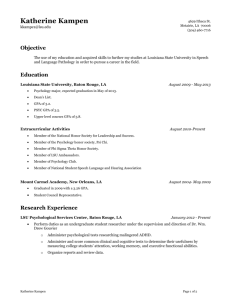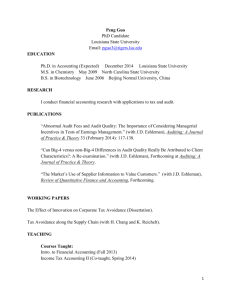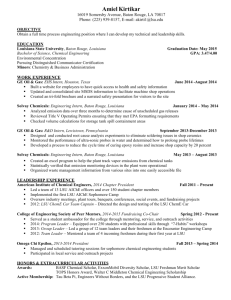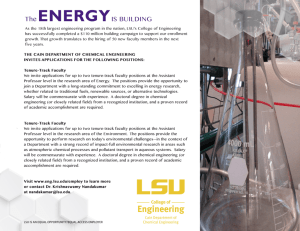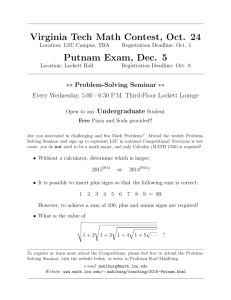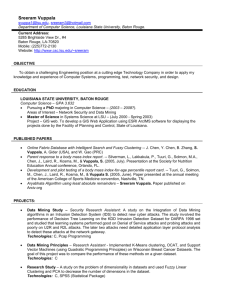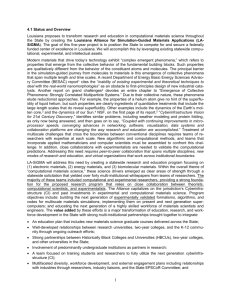Martin Hjortso Louisiana State University Louisiana State University
advertisement
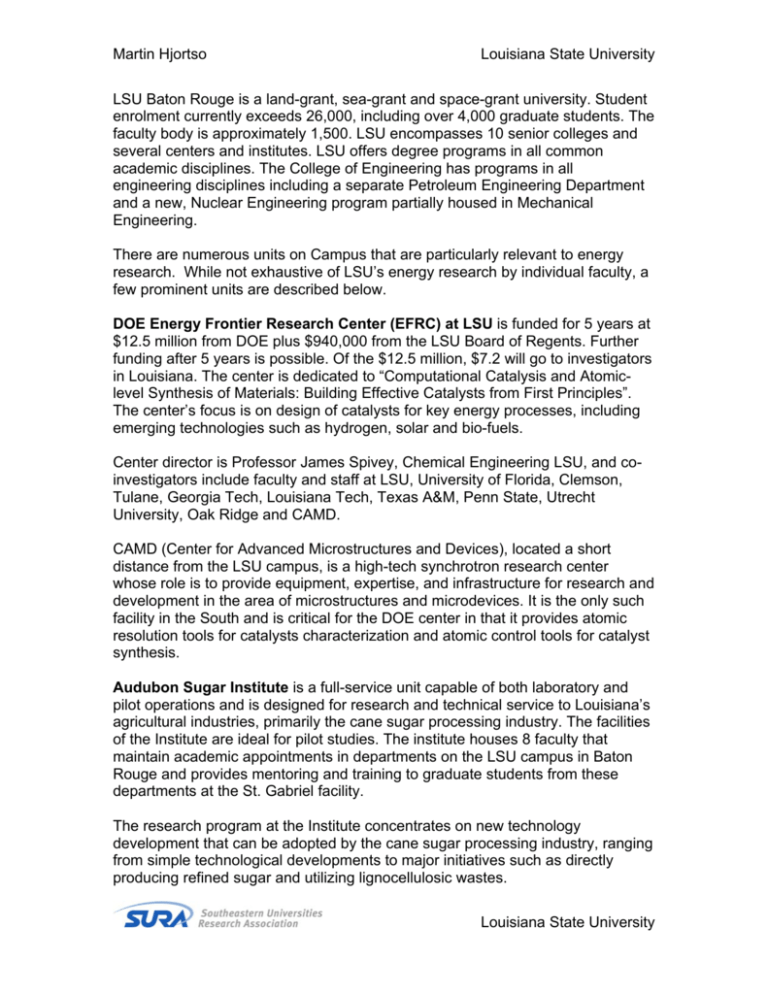
Martin Hjortso Louisiana State University LSU Baton Rouge is a land-grant, sea-grant and space-grant university. Student enrolment currently exceeds 26,000, including over 4,000 graduate students. The faculty body is approximately 1,500. LSU encompasses 10 senior colleges and several centers and institutes. LSU offers degree programs in all common academic disciplines. The College of Engineering has programs in all engineering disciplines including a separate Petroleum Engineering Department and a new, Nuclear Engineering program partially housed in Mechanical Engineering. There are numerous units on Campus that are particularly relevant to energy research. While not exhaustive of LSU’s energy research by individual faculty, a few prominent units are described below. DOE Energy Frontier Research Center (EFRC) at LSU is funded for 5 years at $12.5 million from DOE plus $940,000 from the LSU Board of Regents. Further funding after 5 years is possible. Of the $12.5 million, $7.2 will go to investigators in Louisiana. The center is dedicated to “Computational Catalysis and Atomiclevel Synthesis of Materials: Building Effective Catalysts from First Principles”. The center’s focus is on design of catalysts for key energy processes, including emerging technologies such as hydrogen, solar and bio-fuels. Center director is Professor James Spivey, Chemical Engineering LSU, and coinvestigators include faculty and staff at LSU, University of Florida, Clemson, Tulane, Georgia Tech, Louisiana Tech, Texas A&M, Penn State, Utrecht University, Oak Ridge and CAMD. CAMD (Center for Advanced Microstructures and Devices), located a short distance from the LSU campus, is a high-tech synchrotron research center whose role is to provide equipment, expertise, and infrastructure for research and development in the area of microstructures and microdevices. It is the only such facility in the South and is critical for the DOE center in that it provides atomic resolution tools for catalysts characterization and atomic control tools for catalyst synthesis. Audubon Sugar Institute is a full-service unit capable of both laboratory and pilot operations and is designed for research and technical service to Louisiana’s agricultural industries, primarily the cane sugar processing industry. The facilities of the Institute are ideal for pilot studies. The institute houses 8 faculty that maintain academic appointments in departments on the LSU campus in Baton Rouge and provides mentoring and training to graduate students from these departments at the St. Gabriel facility. The research program at the Institute concentrates on new technology development that can be adopted by the cane sugar processing industry, ranging from simple technological developments to major initiatives such as directly producing refined sugar and utilizing lignocellulosic wastes. Louisiana State University Martin Hjortso Louisiana State University In recent years, the institute has built a significant research program dedicated to conversion of biogases to biofuels. Similar research projects by other groups in the LSU Agricultural Center supplements this effort. Center for Energy Studies is mandated to provide energy information and analysis that responds to the needs of the legislature, public agencies, and business and civic groups. The staff, 23 full time employees, identifies issues with important implications for the state's economy and design studies which address them in a timely and effective manner. The Center maintains some unique energy data bases and is the official repository of energy information from the state and The Energy Council. Staff responds regularly to requests from a wide variety of individuals and institutions for specialized energy data and information. The center coordinates multidisciplinary energy research within the University and the State. The division assists in gathering the necessary expertise, securing funding, and providing research management services for the performance of basic and applied research upon request. Expertise is available for economic analysis of research projects. The center organizes two energy conferences each year. One on traditional carbon based energy, primarily oil, another on alternative energy. Clean Power and Energy Research Consortium is a consortium consisting of five Louisiana Schools (LSU, Tulane, Nicholls State, Southern University and the University of Louisiana at Lafayette). Researchers within this consortium address critical issues related to power and energy generation, with the goal of improving current technology in power generation and emission reduction. Within this framework lies TIER – Turbine Innovation and Research Center (situated within the College of Engineering). The mission of this center is to enhance the understanding of flow, heat transfer and combustion in gas turbines. The LSU Baton Rouge campus, lead by the College of Engineering and the Office for Research and Economic Development, is currently completing an energy research inventory that includes all energy-related research taking place on campus. This inventory will serve as the foundation for a framework of synergistic research across the entire energy platform (oil and gas and biofuels (microalgal and lignocellulosic) to alternative sources including nuclear). This effort will include researchers, industry and state entities focused on evolving Louisiana’s energy prominence beyond oil and gas. Louisiana State University
